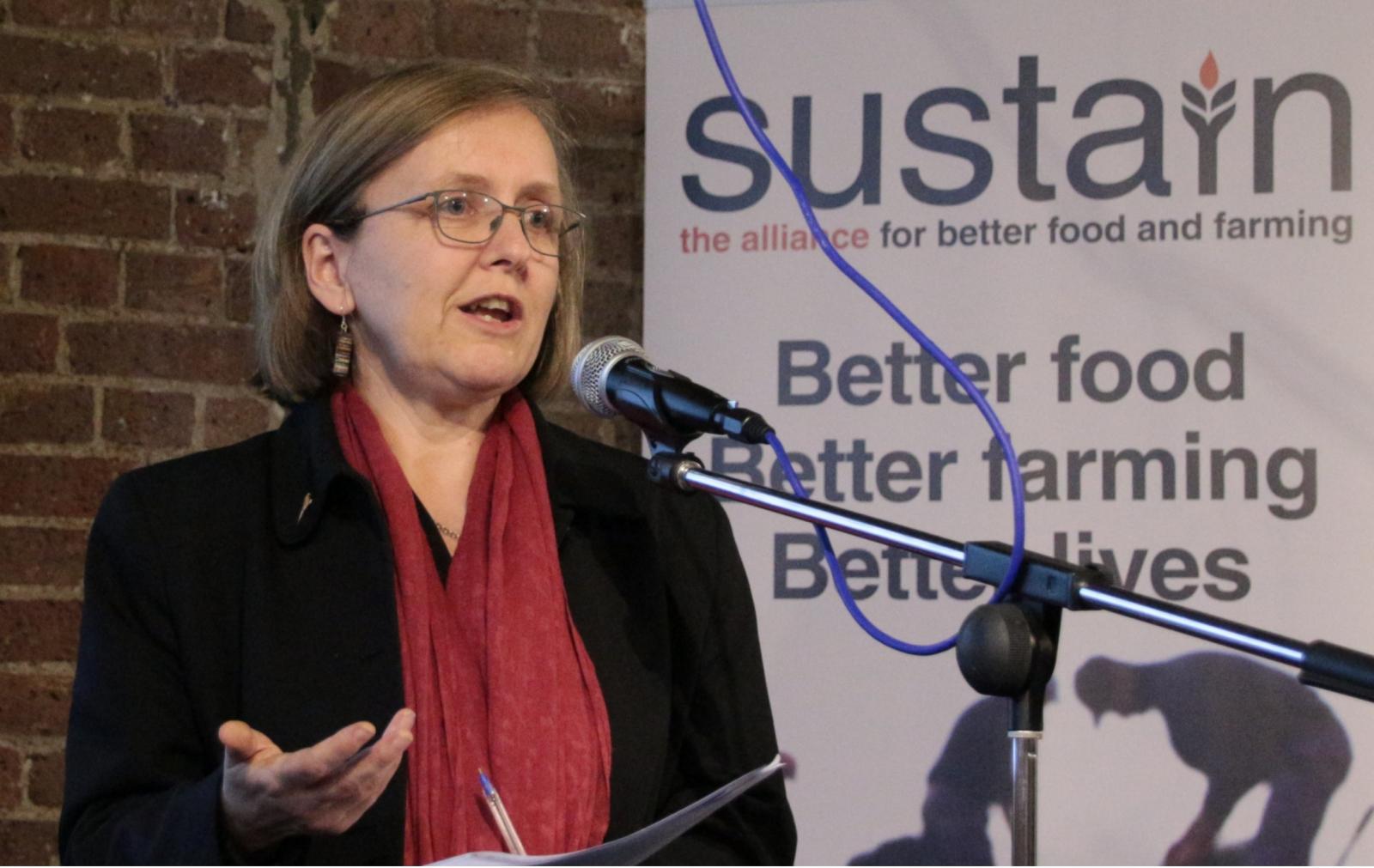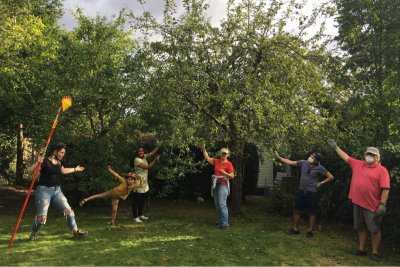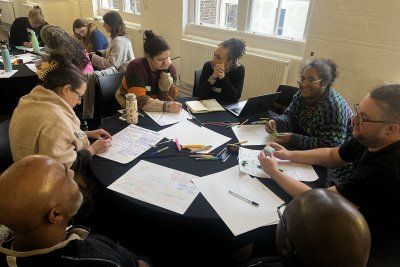

Sustain alliance AGM: Looking forward to 2018
Sustain's CEO Kath Dalmeny reflects on alliance successes over the past year, and looks forward to an intense and potentially transformative 2018, in which Brexit will keep us busy, but other priorities for food, farming and fishing must not be forgotten.
This article is an edited transcript of Kath Dalmeny's presentation at the Sustain AGM and Annual Gathering, held in November 2017.
The Sustain AGM and annual gathering are a wonderful opportunity to be among friends, with a bit of time to reflect – a feeling of ‘taking breath’ that has been in short supply over the past year. Speaking personally, the past year has taken me to a dizzying array of events and meetings with ministers, Michael Gove, MPs and SPADs – to talk about post-Brexit food and farming policy. Also, with wonderful folk tackling problems caused by introduction of Universal Credit, so shamefully putting so many of our fellow citizens into hunger – we’ve had some movement in the Chancellor’s Budget this week – not nearly enough, but it’s a start. Also meetings with great people putting life and soul into making nearly 50 Sustainable Food Cities thrive. Also, bright people applying legal minds to a new Environment Act, Food Act and the Repeal Bill.
And along the way, many bolstering connections with you – our alliance members and other civil society organisations expressing specialist concerns about the impact of Brexit – not just on Britain’s bottom line (ever-present in political and media minds). But also the impact on real people, children, farmers, fishing communities, animals and our cherished environment and wildlife.
My part in these proceedings is to look to the future – to Sustain’s coming year. And boy oh boy, if the past year was a real corker, just look what’s in store for us next. Even Defra is now admitting that its own portfolio is where Brexit will have its most significant impact by a long margin. And whatever you think of Michael Gove, Sustain is choosing (for now) to take Defra at their word and to treat this as an Unfrozen Moment. If we can’t use this unfrozen moment to win significant progress, then when can we? We have to give this a shot. We will need to keep on fire-fighting and keeping up the rear-guard action to save the existing standards and protections that we care about.
However, we also want to focus ever more on a positive vision for the future. We’re calling our collective action the Campaign for a Better Food Britain. And that’s part of what I want to signal tonight – a shift in tone.
The EU Withdrawal Bill (Repeal Bill) – any day now going into its ‘ping pong’ stage, where comments and amendments ‘ping’ and ‘pong’ between the House of Commons and House of Lords. Or perhaps if Boris Johnson is in charge, then it will be ‘wiff’ and ‘waff’, which was his affectionate but idiotic comment on ping-pong at the London 2012 Olympics. On the Repeal Bill, I commend the work of Unlock Democracy and Hansard Society in coordinating responses from civil society – we have been working with them over the course of the past year and there is much more work to do in 2018. What we win or lose in the Repeal Bill will be the foundation stone of what we have to work with, underpinning everything else. So Sustain will play our part in the wider civil-society advocacy work on the Repeal Bill. Get on our Sustain Brexit Forum mailing list if you want to keep updated.
The Agriculture Bill will be published, we hear in Command Paper format, in the spring – perhaps February or March – a more consultative format than a White Paper – with a three-month consultation period (quite a luxury these days!). It’s likely to set out some general objectives and questions on ‘public money for public goods’ but perhaps not the detail of what that will mean and how that will be achieved in practice. That’s where specialists in the Sustain alliance come in. We must work together to influence that process, and thank you to Vicki Hird for so ably leading on that work for Sustain, and to the Greener UK alliance looking at how to integrate our members’ concerns into their more environmentally focused work. The Agriculture Bill must be good for farmers, the farmed environment, farm animals and consumers. It could also support better health through better support for horticulture. It could also support farmers through clever money – subsidies for public goods; investment to ensure that a diversity of smaller and larger farms can thrive; vouchers for low-income people to buy good food from farmers. Many good ideas are coming forward. We will need to work together to use that 12-week consultation period well, starting in spring 2018.
The Fisheries Bill White Paper is due any day now – we get the impression from Defra that they are warmly inclined to the overall objective of achieving Maximum Sustainable Yield, but the navigation towards that golden goal is awash with political sea mines ready to explode, not least our relationship with seafaring European neighbours. Sustain will bolster the efforts of Greener UK’s alliance of marine conservation specialists. We will add our own unique alliance voice, particularly to push policy that builds and rewards the market for verifiably sustainable fish – the decisions from the shore onwards, that support better practices at sea. Greener UK is a division of Green Alliance, so it’s great that we have forged closer links with the Green Alliance by welcoming them to the Sustain alliance tonight as an official Observer, with old friend Chief Exec Shaun Spiers continuing on Sustain’s Board of Trustees.
Then there’s the new Trade Bill and a new Customs Bill. Sustain has started to convene specialist organisations to discuss the consequences of a ‘no trade deal with the EU’ scenario for the British food system. What would it mean to ditch out to WTO standards? What would our food look like if we were forced to accept American meat hygiene rules and chlorine-dipped chicken? Or US baby food standards? Or the amount of corn syrup sugar crammed into many US breakfast cereals? Why should we accept such backwards steps? Or a better question: What are the red lines for future trade deals? What standards and governance mechanisms should we be standing up for?
It’s a good question. What should we be standing up for? Not a Worse Food Britain. A Better Food Britain. People come behind a vision of the future that they want to help achieve. This is our common purpose. I mentioned this at the beginning, and now I want to come to it again. One of the big shifts for the Sustain team is that, yes – there is a massive rear-guard action to be fought, to rescue what we can on the way out, to stop the slide backwards towards worse food, farming and fishing. But Sustain has always stood for something else. We get together as an alliance to build a better food system fit for ourselves, and fit for future generations.
So we will be continuing to press for better hospital food standards. We will continue to support community groups around the country to reduce sugar and resist the arrival of Coca-Cola trucks. We will continue to hold food businesses to account for their fish buying. We will continue to press for an extension of the Groceries Code Adjudicator to protect farmers from unfair trade. And we will continue to support communities to grow, cook, trade, access and save more of their own food, supported by government, local authorities and planning policy. This and much more.
I find immensely helpful the clarity that comes from thinking in terms of ‘rear-guard’ action and ‘building towards a better future’ – one is more negative and one is more positive. It affects how we communicate, present ourselves, bang the table in meetings with ministers and industry, and whether people feel inspired to get involved.
But another thing. I’ve necessarily been obsessed with Brexit over the past year, on behalf of the Sustain alliance. But let’s not forget that together, we have been building the robust pieces of the vision and practicalities of a Better Food Britain over the past 20 years. Indeed, the Sustain alliance will celebrate our 20th birthday just as the UK leaves the European Union. Our collective work has been on sustainable farming and fishing policies and subsidies; sustainable fish procurement; hospital food standards; children’s food marketing; land for community gardens and horticulture in and around our towns and cities; Real Bread; cultivating creative food entrepreneurs; helping local authorities to step up to the challenge of tackling food poverty upstream rather than simply plugging the gap with food banks; integrating good food into GP prescribing; winning a sugary drinks tax. Better Food Britain? We were already working on it. It is what Sustain does. Brexit has at one level been the most tremendous distraction from these far more important things. But it’s the new world we have been plunged into, and we must make sure that our positive vision and solutions are heard.
To that end, I’m especially delighted that two ace communicators have joined the Sustain team this year – Emma Weatherill and Orla Delargy.
And I’m also pleased to let you know that I have just been appointed as a Commissioner to the new Food, Farming and Countryside Commission, coordinated by the RSA. It is chaired by Sir Ian Cheshire and is under the directorship of our new friend Sue Pritchard. Four other Commissioners are also members of the Sustain alliance – representing the Soil Association; Faculty of Public Health Green Alliance and the National Federation of Women’s Institutes. You’ll remember that Sir Don Curry joined our Sustain AGM and Annual Gathering last year to talk about the previous 2002 Food and Farming Commission, which helped put farming back on its feet after Foot and Mouth Disease in the early 2000s. It’s rather bolstering to think that just 10 months ago, the idea of the Commission was still but a twinkle in the eye of its proponent Helen Browning; and its inspiration Sir Don Curry.
So I’m honoured now to have been invited to participate on behalf of the Sustain Alliance. And let me here make my personal commitment to you, Sustain alliance members. When I accept a position on a group such as the Commission, or we – myself and my colleagues attending meetings with ministers, MPs and (occasionally) Michael Gove – we do so knowing that I must act as a doorway to your concerns and expertise. I sometimes sit at these various meetings feeling that I should put an actual door on the table, knowing that I am there as an opening to Sustain Alliance expertise and voices. So please use this door. Make sure that you let us know – via the channel all of our specialist projects and campaigns, what you want us to be saying, or perhaps shouting – as we walk through that door, knowing that we do so on behalf of you – the Sustain Alliance. And knowing that I, and my wonderful colleagues, treat this a great responsibility and a great privilege.
Thank you for all of your support over the past year. And let’s gird ourselves for a very intense and transformative year to come.
Read also Sustain's Chair Professor Mike Rayner speaking about Sustain alliance: celebrating our achievments for food, farming and fishing, also at Sustain's AGM and Annual Gathering, November 2017.
Good Food Trade Campaign: Campaigning for good trade that benefits people and the planet at home and overseas.
Sustain
The Green House
244-254 Cambridge Heath Road
London E2 9DA
020 3559 6777
sustain@sustainweb.org
Sustain advocates food and agriculture policies and practices that enhance the health and welfare of people and animals, improve the working and living environment, promote equity and enrich society and culture.
© Sustain 2026
Registered charity (no. 1018643)
Data privacy & cookies
Icons by Icons8







